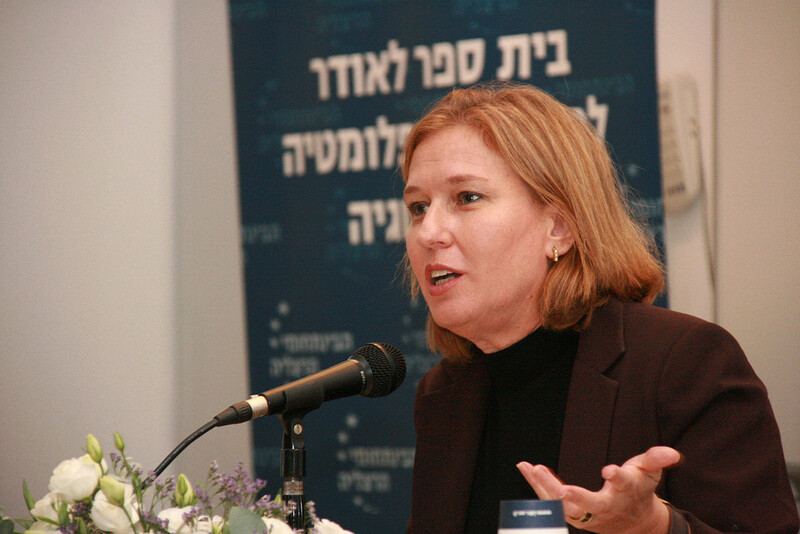Power Suits 27 November 2013

All is forgiven: the EU appears to have forgotten that Tzipi Livni authorized a murderous attack on Gaza. (Itzik Edri/Flickr)
A short memory can be an asset in politics.
Around this time five years ago, Tzipi Livni was being fêted as a paragon of moderation by EU insiders as she won a commitment to “upgrade” Israel’s relations with the Union. The love turned a little sour soon afterwards when Livni marked the end of her stint as foreign minister by approving a brutal three-week offensive against Gaza.
The human suffering caused by this monstrous crime seemed to upset European diplomats far less than how Livni hadn’t given them advance notice of the plans to attack; it all came as a “nasty shock,” one senior Brussels official told me.
It didn’t take long for Livni to be forgiven for springing that surprise. This week, she reached an agreement with Catherine Ashton, the EU’s foreign policy chief, to end an unseemly squabble over guidelines aimed at preventing firms and institutions active in Israeli settlements in the occupied West Bank from receiving EU subsidies.
Apartheid’s “sensitivities”
A joint statement by the duo says that the agreement respects both the EU’s “financial requirements” and Israel’s “political sensitivities.” Precise details on how the guidelines will be implemented were not contained in the statement but it appears that a bureaucratic formula has been found which will allow firms profiting from the occupation (as most Israeli firms do) to continue benefiting from EU subsidies.
I had a vomiting bug last week. Having read that statement, I feel like throwing up again.
If the European Community (the EU’s precursor) had promised to respect the “political sensitivities” of South Africa when it was under white rule, you can be sure it would have been excoriated by progressives the world over. Why should Israel be treated any differently?
Tasking Livni with sorting out the “guidelines” row was an admittedly shrewd move by Benjamin Netanyahu’s government. She enjoys a much better rapport with the EU elite than Avigdor Lieberman, lately re-appointed as foreign minister.
Blood on their hands
The stylistic differences between Livni and Lieberman notwithstanding, both have blood on their hands. Both have authorized military operations against Gaza, in which the main victims were innocent civilians. Both represent an apartheid state.
Livni has never repented for — in her own words — encouraging the Israeli military to go “wild” when it bombed Gaza in December 2008 and January 2009. Until she displays genuine remorse — or, better still, is punished for her war crimes — there can be no reason to forgive her.
The involvement of Livni was the only thing I found surprising about how the “guidelines” issue was resolved. (Settling diplomatic disputes of this nature is not normally the job of a justice minister.)
Tips for settlers
Ever since the guidelines were leaked to the Israeli press during the summer, EU representatives have been eager to downplay their significance.
The Union’s embassy in Tel Aviv swiftly published advice on its website about how the recommendations could be circumvented. One helpful tip was that Israeli banks active in the occupied West Bank could continue applying for EU loans, provided the end recipients of the money were based within present-day Israel.
The questions involved here are, of course, bigger than a simple bilateral spat.
Next month, the prime ministers and presidents of the EU’s 28 countries will gather in Brussels for a summit devoted to building a stronger weapons industry.
More than likely, the communiqué they will issue following this confab won’t mention Israel explicitly. But anyone who has followed the EU’s “defense” debate closely — as I’ve had the misfortune of doing — knows that European weapons-makers are being encouraged to foster close relations with their Israeli counterparts.
Challenge
It was by no means accidental that François Hollande, the French president, was accompanied by representatives of the arms-maker Thales or that Antonio Tajani, the EU’s enterprise commissioner, brought along salesmen from its Italian equivalent Finmeccanica when the two men visited Israel recently.
The agreement between Ashton and Livni paves the way for Israeli arms makers to receive grants from Horizon 2020, as the EU’s new scientific research program is called. Allocating a greater share of the Union’s science budget to the weapons industry will almost certainly be one of the topics discussed at the aforementioned summit in December.
Despite feeling a little despondent upon hearing about the EU’s latest act of capitulation towards Israel, I’m not entirely disheartened. The decision by EU diplomats to draft these guidelines was a small victory for those Palestine solidarity activities who have exposed how taxpayers’ money was going to Ahava, a firm making cosmetics in an Israeli settlement.
These guidelines would never have been drawn up if the Union hadn’t been shamed and embarrassed into doing so. The challenges we face now are to keep on drawing attention to the EU’s embrace of Israel and to demand genuine action against that apartheid state.






Comments
FOR THE APPARENTLY UNIVERSAL LOVE OF DEFENSE MONEY
Permalink Peter Loeb replied on
The operations of lthe defense lobby are central for both the US and Israel.
For a most readeable and incisive expose of the defense lobby read John
Tirman's THE SPOILS OF WAR.... The late Chalmers Johnson once wrote:
"If you read nothing else about this, read this book." You will perceive the
similarities with AIPAC. The basis within the context of the US is not the
military itself (as in the fiction "the military-industrial complex") but in the
direction given the compliant military by civil authority argues historian Gabriel
Kolko in THE ROOTS OF AMERICAN FOREIGN POLICY: AN ANALYSIS OF
POWER AND PURPOSE. Israel once sought to tie its fortunes to the UK but
later switched to the US according to I Pappe in the HISTORY OF MODERN
PALESTINE.